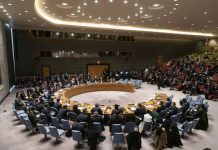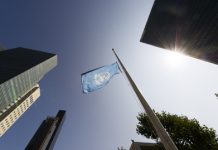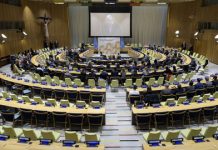Preventable ‘meningitis belt’ deaths targeted in health agency action plan
Millions of deaths could be avoided from meningitis if countries implement new UN health agency guidelines designed to diagnose and treat the disease more effectively, it said on Thursday.
Sub-Saharan Africa is known as the “meningitis belt” because it sees most cases and outbreaks.
Bacterial meningitis is the most dangerous form of the disease and can kill within just 24 hours – and one in six people die once they’ve become infected.
Low and middle-income nations are worst-affected and around one in five people who contracts bacterial meningitis develops long-term complications.
In the most serious cases, disabilities caused by the disease include hearing loss and blindess, along with permanent brain and nerve damage.
Here’s Dr Marie-Pierre Preziosi, WHO Team Lead for Meningitis:
“Every family who has had a meningitis case knows about what fear this disease can bring and an epidemic, even a small cluster of meningitis in any country can be a threat to the government – it is a high-profile disease.”
The UN health agency’s new guidelines form part of the global commitment to eradicate meningitis by 2030.
The WHO works with partners including the MenAfrinet network to support countries collect and analyze high-quality disease surveillance data. This enables the monitoring of the impact of preventative action including the Meningitis A vaccine.
UN top economist appeals for tariff damage-limitation measures
The world’s poorest nations face big consequences from the imposition of heavy United States tariffs and should be spared from the policy, the UN’s trade and development agency has said.
In an appeal for the US to reconsider its strategy, head of the UN agency, Rebeca Grynspan, explained that although the world’s 44 Least Developed Countries contribute less than two per cent of the US’s trade deficit, higher tariffs would only make their existing debt crisis much worse.
The precarious financial situation for developing nations will become even more difficult if governments raise interest rates to combat inflation.
This is the expected outcome as living costs rise linked to the new US policy – although it is now on pause for 90 days for most countries, except China.
Ms. Grynspan said that global investment faces paralysis until there is more clarity about the US policy on tariffs.
She told UN News in an interview on Thursday that continuing uncertainty was doing the most damage:
“We cannot strategize, we cannot plan. Investment is paralyzed. What you hear from the CEOs is sit and wait, and sit and wait means investment is not coming back in the scale that the world needs it to be. The first call is for rational decisions to be taken, but at the same time, that we will be able to know what the final situation will be – so we can plan, strategize, and adapt…But the first thing is to know, what is it? And we still don’t know.”
Gaza: Bombs still falling as Israel’s lifesaving aid blockade goes on
To Gaza, where Israeli shelling continues every day along with ongoing military operations and evacuation orders, UN aid teams said on Thursday.
Israel’s total blockade on all commercial and lifesaving relief supplies remains in place, while in a rare piece of good news, the World Health Organization (WHO) announced that 18 Gazans needing specialist medical care had been evacuated from the enclave.
The WHO said that the patients along with their companions left the war-torn Strip on Wednesday, headed for Norway, Malta, Luxembourg and Romania via the Kerem Shalom crossing in southern Gaza.
The UN health agency said that up to 12,500 patients in Gaza are still in desperate need of medical evacuation.
Access to health care facilities has been impacted by displacement orders issued by the Israeli military and the safety of healthcare workers remains at risk.
At least two medical professionals were reported killed as they left their health facility in Gaza City on 7 April, the UN aid coordination office (OCHA) said in an update.
Today in Gaza, 12 out of 17 hospitals are partially functional and there is only one field hospital.
Daniel Johnson, UN News.
Source of original article: United Nations (news.un.org). Photo credit: UN. The content of this article does not necessarily reflect the views or opinion of Global Diaspora News (www.globaldiasporanews.com).
To submit your press release: (https://www.globaldiasporanews.com/pr).
To advertise on Global Diaspora News: (www.globaldiasporanews.com/ads).
Sign up to Global Diaspora News newsletter (https://www.globaldiasporanews.com/newsletter/) to start receiving updates and opportunities directly in your email inbox for free.





























